Published: July 6, 2017
Highlights from this release include links from Congressional Record Details pages to related bills, a variety of enhancements based on feedback from users, thumbnails in search results, pagination for optimized browsing, in-context help information, new developer tools including a govinfo link service, RSS notifications, minor fixes and improvements, and efforts behind the scenes as we continually work to improve how we're managing the information you have access to through govinfo.
Request features, report issues, or provide general feedback on the govinfo beta site by clicking "Feedback" at the top of any page across the site.
Links from Congressional Record Details Pages to Related Bill Versions
Related bill versions are now linked to applicable Congressional Record details pages. See an example.
To see links to related documents on govinfo, simply navigate to the Details page of an applicable publication and click the Related Documents tab. Learn more about finding related documents on govinfo or download the quick reference guide (PDF).
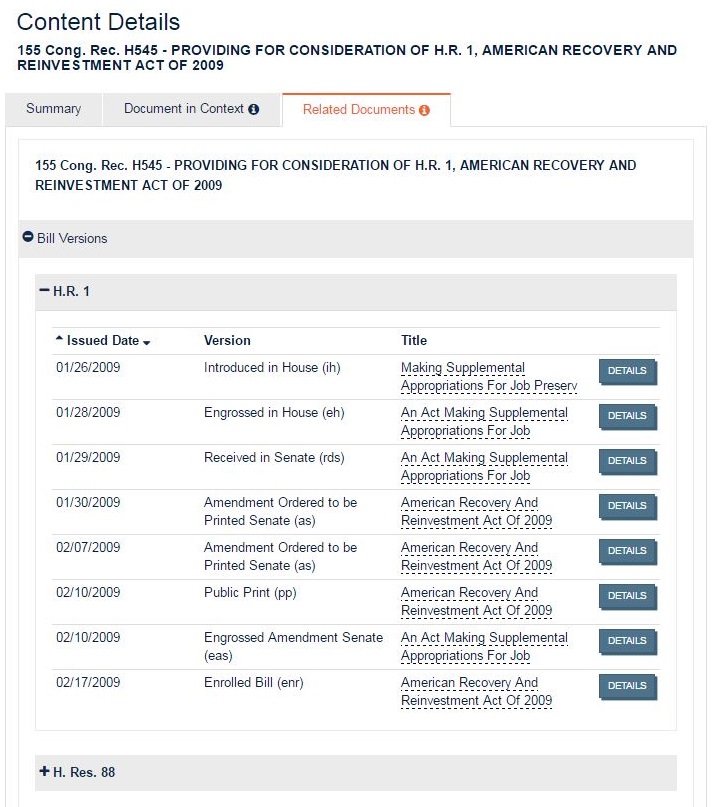
Enhancements Based on User Feedback
User feedback drives many of the enhancements we make. Here are a few improvements we implemented this release directly from user feedback. Let us know how we did and how we can do better.
Updated site display to accommodate Congressional Record issues that are spread across multiple books. See an example.
Updated the search button in the top right corner of pages across the site to more explicitly reflect its purpose.
Search button before feedback: 
Search button after feedback:
Thumbnails in Search Results
Thumbnails display in search results for applicable documents.
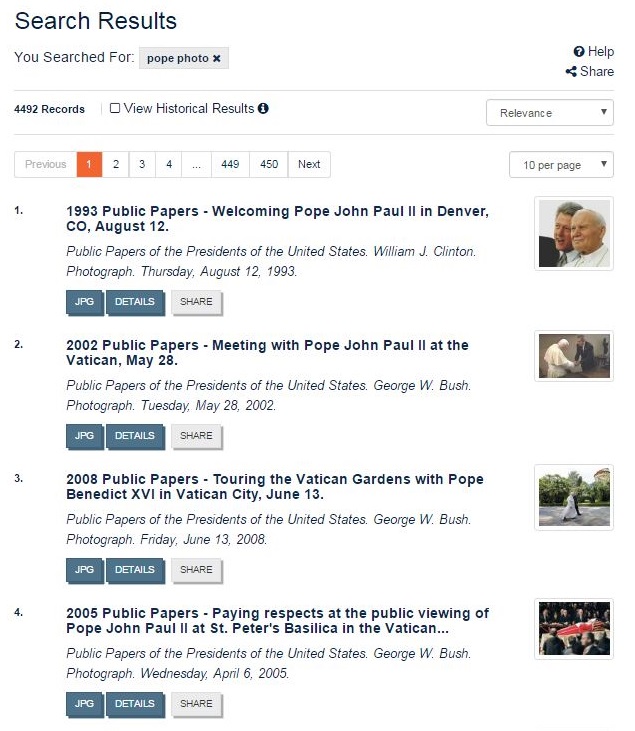
Pagination for Browsing
To optimize your experience while browsing certain lists of documents that include more than 500 items, pagination has been implemented on applicable browse pages (see an example)
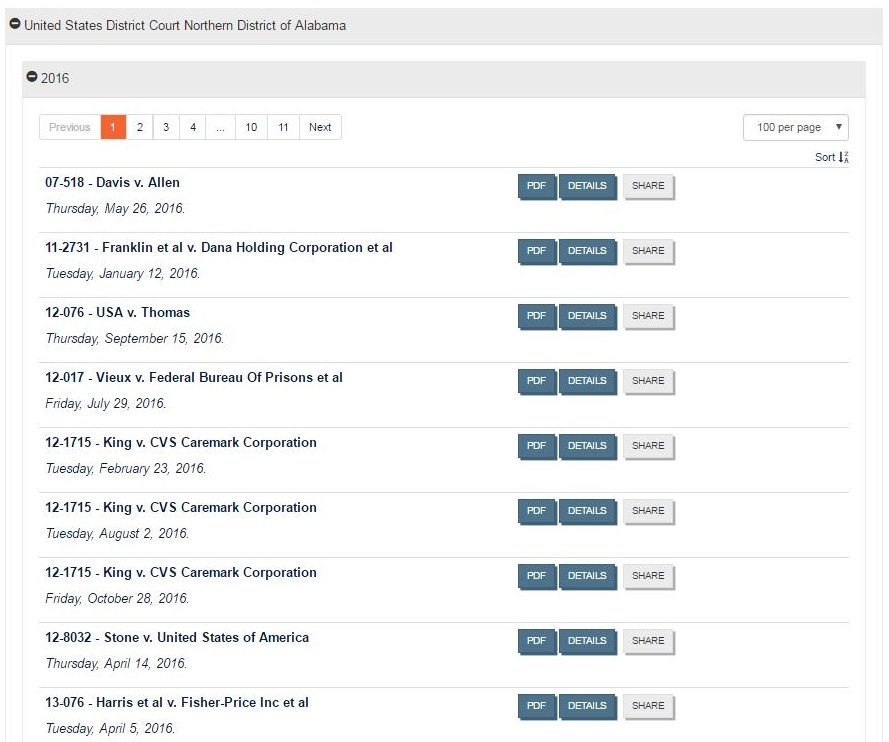
In-Context Help Information
Now you have more help built in where you need it. Just hover (or tap on mobile) when you see these indicators that help information is available:

Hover over (or tap on mobile) the metadata elements on Details pages for a description.

Hover over (or tap on mobile) the for more information.
RSS Notifications
RSS feeds are now available for many govinfo collections and bulk data. You can subscribe to RSS feeds for a free and easy way to find out when new content is available on govinfo.
What is RSS?RSS or Rich Site Syndication (also “Really Simple Syndication”) feeds are free content feeds from websites that contain links to the pages on the website. On govinfo, there are RSS feeds available for the main content collections, bulk data collections, and individual feeds for each U.S. Court, and generally each feed includes articles with links to the Details page, available content formats, metadata formats, and Zip file download of all content and metadata.
Why use RSS?RSS is an easy way to gather a wide variety of content in one place on your device. Rather than having to visit many websites to find out if there is new content, the RSS aggregator shows it all to you in one screen. Many RSS readers also alert you when new content from your favorite website is delivered.
How do I use RSS?Special news readers, called "RSS Readers" or "RSS Aggregators" are required for you to be able to use RSS feeds. Options for news readers are varied and include stand-alone applications, plug-ins for Firefox and Outlook, built-in applications (Internet Explorer, Chrome, Safari), and Web-based services.
To subscribe to a news feed, right click one of the links on the RSS Feeds page and select "Copy Link Location" or "Copy link address" or "Copy shortcut" depending on the browser you are using. All news readers are a little different but look for an option in your RSS aggregator that says "Add Feed" or "Import". In the resulting form, paste the copied link in the input field and save.
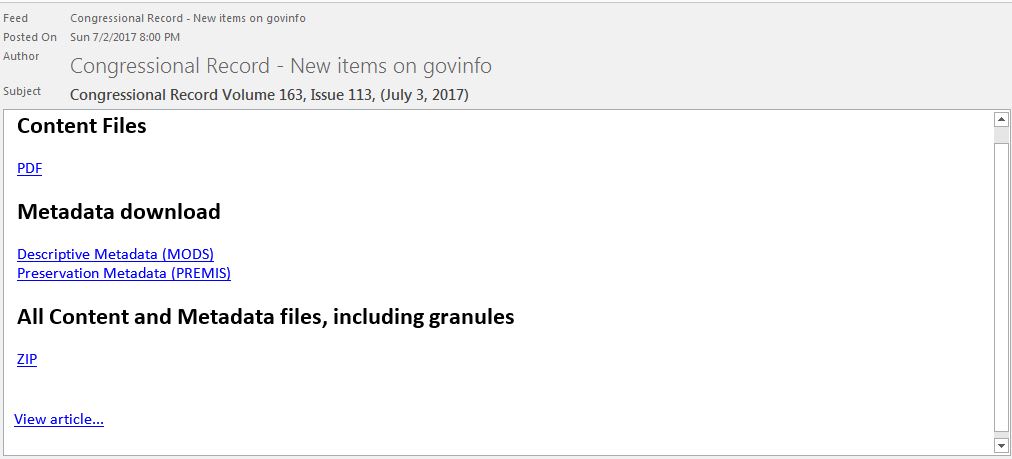
An example of how a Congressional Record RSS notification may display.
Minor Search and Display Fixes and Improvements
- Added full SuDoc numbers and GPO ILS System ID numbers to metadata for over 11,000 hearings, prints, reports, documents, and public laws. For example, for many hearings, the full SuDoc number and ILS System ID number are now displayed on the Summary tab, and the link under Actions on the left takes you to the record in the Catalog of Government Publications (CGP). See an example
- Enabled the Congressional Prints collection to accept XML rendition files and the Federal Register collection to accept JPEG2000 files in support of digitized content
- Fixed bug preventing Public and Private Law References field from displaying correctly on bills Details pages
- Fixed handling of certain special characters in search; for example, search queries that contain Côte d'Ivoire, Prime Minister Taavi Rõivas, or Krün, Germany
- Enabled Advanced Search to accept date format YYYY-MM-DD (in addition to Month Day, Year format) when searching over the Dates field in the Federal Register
- Removed Speaking Congress Member metadata field from several Congressional Record documents where members submitted responses but did not actually speak
- Fixed issues in several collections related to display of text file renditions
- Ensured consistency of error message display across the site
- Added History subsection tag to Privacy Act Issuances for future use in support of the new mandate for a "History" paragraph be added to new privacy act notices
- Updated browser tab text for Details pages for accuracy and consistency
- Fixed bug in searching U.S. Code citations in basic search
- Enabled hyperlinking functionality in the description field on the Details page for certain publications
Developer Tools
A link service, using an open API specification, is now available for select collections. Developers and webmasters can use this tool to create links to content and metadata.
The govinfo link service mimics the functionality of the existing FDsys link service, but with interactive, user-friendly documentation and link creation through a user interface that provides validation of request parameters and drop-down/selects for known values (such as available bill types or bill versions). This framework will be used to document newer features of the forthcoming govinfo API which will be query-based to return a set of search results, or specific metadata fields for content matching the request.
To see how the link service works, visit the Link Service page, expand a section under any collection, and click "Try It Out." You can then input or select values to retrieve content, metadata, or a details page for a specific publication.

User interface for link service
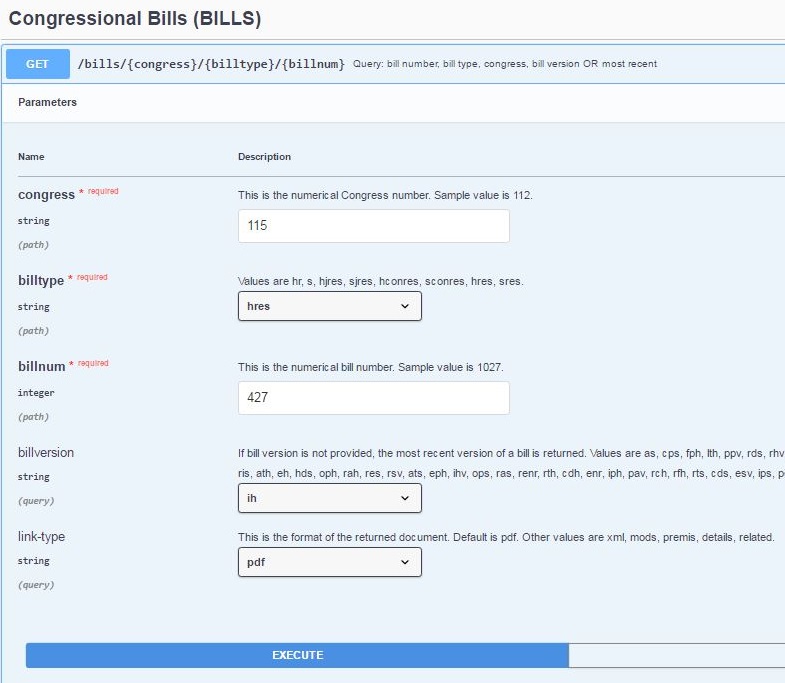
Example of user inputs to link service user interface
Additional work was done this release to enable sitemaps, a structured list of available content that can be parsed and indexed for any crawler that can follow links. The next step is to populate the sitemaps to include all content so look for an announcement coming soon when this process is complete.
GitHub IssuesWe fixed two bill status bulk data issues this release (GitHub Issue #55 and #56 )
Behind the Scenes
GPO's govinfo is more than a website with advanced search capabilities; it's also a content management system and preservation repository.
Many activities go on behind the scenes as GPO maintains all three of these components, provides daily operational support, and continually works to improve how we're managing the information you have access to through govinfo.
Here are some of those activities we worked on for this release.
- Generation of automated file characteristics reports for digitized JPEG2000 files
- Generation of automated integrity check reports
- Retaining digital signature properties after re-processing
- Parser fix for retaining metadata changes made for certain collections when they are re-processed
- Capturing bulk data event information to support RSS feeds
- Additional improvements to the performance and stability of existing site functionality
New Content Highlights

Digitized Bound Congressional Record 1951 - 1960 Now Available
Made available June 28, 2017.

American Health Care Act of 2017
Made available May 9, 2017.

Budget of the U.S. Government, Fiscal Year 2018
Made available March 23, 2017.
Feature Article Highlights

Anniversary of the Homestead Act of 1862
May 19, 2017 – Signed into law on May 20, 1862, the Homestead Act encouraged Western migration by providing settlers 160 acres of public land

217th Anniversary of the Establishment of the Library of Congress
April 24, 2017 – On this day in 1800, the Library of Congress was established by an act of Congress

Armed Forces Day 2017
May 22, 2017 - Observed the third Saturday in May, Armed Forces Day pays tribute to the men and women who serve in the United States military
Coming Soon
What we're working on next.
- Populating sitemaps for govinfo
- Initial planning for redirects from FDsys to govinfo
- Efforts to support additional content availability
- Efforts to support metadata migration
- Performance optimization
- Additional links between select related documents within the system
- Additional minor enhancements and fixes
